Artificial Intelligence (AI) has revolutionized numerous aspects of our lives, and the business landscape is no exception. From content creation to supply chain operations, AI is reshaping traditional approaches and unlocking new avenues for growth. However, as with any transformative technology, challenges and ethical considerations exist. So, let’s dive into the realm of AI and explore its role in shaping modern business processes.
How AI is Changing the Business Landscape

Artificial Intelligence, specifically Generative AI, is a branch of machine learning that involves training AI systems to create original content, mimic human-like creativity, and make informed decisions. This technology has transcended the boundaries of mere automation and is now a driving force behind innovation in business operations.
From drafting compelling marketing copy to generating fresh product concepts, AI makes its presence felt in diverse sectors. As business leaders harness the capabilities of AI, it becomes evident that a new era of efficiency and creativity is upon us.
Exploring the Potential of Generative AI
Machine Learning technology, especially Generative AI, holds immense potential to revolutionize content creation and enhance customer experiences. Imagine an AI-driven chatbot capable of understanding and responding to customer requests with the nuance of a human brain. This technology is already in use with the wave of Chat-GPT and similar platforms and can be employed in elevating customer relationship management to new heights.
Additionally, AI tools are poised to streamline job processes across various industries. Complex tasks that once demanded hours of human labor can now be completed more efficiently, allowing professionals to focus on strategic thinking and higher-level decision-making.
Creating Content with Generative AI

Writing Automated Marketing Content
In a world where content is king, Artificial Intelligence systems armed with natural language processing produce high-quality marketing content that resonates with target audiences. These systems analyze consumer trends, competitor strategies, and historical data to generate content that aligns seamlessly with business objectives.
Businesses can maintain a consistent online presence by leveraging AI-generated content, freeing time and resources for other critical tasks.
Personalized Customer Communication
AI’s capacity to analyze vast datasets enables businesses to tailor customer interactions. Artificial Intelligence systems can draft personalized emails, messages, and recommendations by analyzing customer preferences, purchase histories, and feedback.
Imagine receiving product suggestions that align perfectly with your past purchases and preferences, all thanks to AI’s ability to understand and predict your needs.
Innovating Product Design and Development
Using AI to Generate New Product Ideas
Generating innovative product ideas can be challenging, but AI is up to the task. By analyzing existing market trends and customer feedback, Artificial Intelligence can propose unique product concepts that align with consumer demands.
These AI-generated ideas can be a starting point for human designers and engineers, sparking collaborative creativity that accelerates the product development cycle.
Prototyping and Iteration with AI Assistance
Deep learning models power AI to generate prototypes and iterate on designs. AI can suggest design modifications and improvements by analyzing historical data and market trends, leading to more refined product offerings.
This iterative process reduces the time required for design enhancements and enhances the end product’s overall quality.
Enhancing Customer Experience

Customized Recommendations through AI
AI is transforming the way businesses recommend products and services to their customers. By analyzing user behavior and preferences, Artificial Intelligence can offer personalized suggestions that cater to individual needs.
Whether it’s suggesting new products, complementary items, or relevant services, AI-driven recommendations enhance the customer’s shopping journey.
Chatbots for Improved Customer Support
Gone are the days of frustrating wait times and generic responses in customer support. AI-driven chatbots are now equipped with natural language processing capabilities to understand and respond to customer queries in real-time.
These chatbots not only provide swift solutions but also collect valuable data that can be used to improve business processes and customer experiences.
Data Analysis and Decision Making
Extracting Insights from Large Datasets
Modern businesses generate immense data, and AI’s analytical prowess is instrumental in extracting meaningful insights. Artificial Intelligence systems can identify patterns, trends, and correlations that might go unnoticed by human analysts.
These insights provide valuable guidance for strategic decision-making, helping businesses stay competitive in dynamic markets.
AI-Driven Predictive Analytics
Predicting future trends and outcomes is crucial for effective business strategy. AI’s predictive analytics capabilities enable businesses to forecast market trends, customer behaviors, and supply chain demands.
By leveraging these predictions, businesses can proactively adjust their strategies, optimize resource allocation, and remain agile in an ever-evolving market.
Automating Tedious Tasks

Streamlining Repetitive Business Processes
From data entry to invoice generation, AI’s automation capabilities shine in mundane and repetitive tasks. By streamlining job processes, Artificial Intelligence can help businesses minimize errors, reduce operational costs, and allocate human resources to more strategic endeavors.
AI’s accuracy and consistency in handling routine tasks contribute to improved efficiency and overall productivity through business process automation.
From Data Entry to Invoice Generation
Imagine a scenario where invoices are generated, processed, and sent to clients without manual intervention. AI’s data processing capabilities make this a reality, eliminating the need for manual data entry and reducing the chances of errors.
This seamless integration of AI into business processes saves time and enhances the accuracy of financial transactions.
Ethical Considerations of AI
Addressing Bias and Fairness in AI Output
While AI holds enormous potential, it’s essential to acknowledge and address potential biases embedded within AI systems. AI systems learn from historical data, which may contain inherent biases that could lead to discriminatory outcomes.
Businesses must invest in diversity and inclusion efforts to ensure that AI-generated content and decisions are fair and unbiased.
Providing Transparency and Accountability
As Artificial Intelligence generates content and makes decisions, transparency becomes paramount. Business leaders must ensure the AI systems’ decision-making processes are understandable and accountable.
Businesses can build trust with customers and stakeholders by providing insights into how AI reaches its conclusions.
Challenges of Implementing Generative AI

Integration with Existing Systems and Tools
Integrating new AI systems into established business processes can be complex. Ensuring that AI seamlessly interfaces with existing tools, databases, and software requires careful planning and execution.
Businesses must collaborate with AI experts to navigate integration challenges and maximize the benefits of AI implementation.
Skill Gap and Workforce Training
Adopting AI may require upskilling or reskilling the existing workforce. As Artificial Intelligence becomes integral to daily operations, employees must develop a working understanding of AI concepts and functionalities.
Investing in comprehensive training programs ensures employees can leverage AI effectively to enhance productivity and contribute to the company’s success.
Balancing Human Creativity and AI
Leveraging AI as a Creative Assistant
AI’s ability to generate ideas and content doesn’t replace human creativity but enhances it. Businesses can employ AI as a creative assistant, providing inspiration and suggestions that fuel human imagination.
Collaboration between humans and AI results in dynamic and innovative solutions that are impossible through individual efforts.
Preserving Human Touch in Business Processes
While AI excels in automation and analysis, the human touch remains invaluable in certain business processes. Customer interactions that require empathy, emotional intelligence, and nuanced understanding are best handled by humans.
Balancing AI’s efficiency with the human touch ensures a holistic and customer-centric approach to business operations.
Intellectual Property and Copyright Concerns
Ownership of AI-Generated Content
The question of ownership arises when AI generates creative works. Businesses must establish clear policies regarding the ownership and usage rights of content produced by Artificial Intelligence.
This includes considering copyright issues and determining whether AI-generated content is the intellectual property of the AI creator or the business employing it.
Navigating Legal Boundaries
AI’s impact extends to legal realms, raising questions about liability and accountability. Who is responsible if an AI system generates content that infringes on copyright or produces misleading information?
Businesses must work closely with legal experts to navigate these complex legal issues and ensure compliance with intellectual property laws.
Data Privacy and Security

Protecting Sensitive Information
AI’s capabilities are often contingent on access to large volumes of data. Businesses must prioritize data security to protect sensitive customer information and proprietary business data.
Implementing robust cybersecurity measures helps safeguard data from unauthorized access and potential breaches.
Mitigating Risks in AI-Generated Solutions
As businesses rely more on AI-generated solutions, there’s an inherent risk of errors or misinterpretations. AI may misunderstand context or produce unintended outputs, impacting business operations and customer experiences.
Implementing rigorous testing and quality control procedures minimizes these risks, ensuring that AI systems consistently provide accurate and reliable solutions.
Managing Customer Expectations
Setting Realistic AI-Generated Output Expectations
While AI is a powerful tool, managing customer expectations is essential. Communicating the capabilities and limitations of AI-generated solutions helps prevent disappointment and ensures a positive customer experience.
Setting clear boundaries helps customers understand the role of AI and appreciate the value it brings to their interactions with businesses.
Educating Customers about AI Usage
Businesses can build customer trust by providing transparency about AI’s role in their operations. Communicating that AI aids in enhancing services, improving efficiency, and personalizing experiences can alleviate concerns and encourage customer acceptance.
Educated customers are more likely to embrace AI-driven solutions and view them as valuable additions to their interactions with the business.
Future Trends in Generative AI
Evolving Applications in Various Industries
The potential of AI is boundless, and its applications will continue to expand across industries. AI’s impact will be felt far and wide, from healthcare to finance, retail to entertainment.
As AI technology advances, businesses will find new and innovative ways to integrate generative AI into their processes, further revolutionizing how they operate and engage with customers.
Continuous Advancements in AI Technology
The world of AI is constantly evolving, with researchers and developers pushing the boundaries of what’s possible. Deep learning models are becoming more sophisticated, enabling AI to understand context, generate more human-like content, and make increasingly accurate predictions.
Businesses that stay up-to-date with AI advancements can capitalize on cutting-edge technologies to gain a competitive edge in their respective industries.
Successful Implementation Strategies
Gradual Adoption of AI in Business
Implementing generative AI doesn’t require a complete overhaul of existing systems. Businesses can adopt AI in phases, starting with pilot projects and gradually expanding its integration.
By starting small and assessing the impact, businesses can identify the best use cases for AI and refine their implementation strategies.
Measuring ROI and Business Impact
While the benefits of AI are evident, it’s crucial to measure its Return on Investment (ROI) to ensure that it aligns with business goals. Tracking key performance indicators, such as improved efficiency, reduced costs, and enhanced customer satisfaction, helps quantify the tangible impact of Artificial Intelligence on the bottom line.
Regularly evaluating the ROI of AI initiatives enables businesses to fine-tune their strategies and optimize their use of generative AI.
Conclusion
In conclusion, Generative AI is transforming the business landscape, from content creation to supply chain operations. By harnessing the power of artificial intelligence, businesses can automate processes, enhance customer experiences, and make more informed decisions.
However, navigating challenges such as bias, integration, and ethical considerations is vital while balancing human creativity and AI’s capabilities. As Artificial Intelligence technology continues to evolve, its role in shaping the future of business processes is undeniable. Embracing this technology with a strategic and informed approach can position businesses for success in an AI-driven world.





